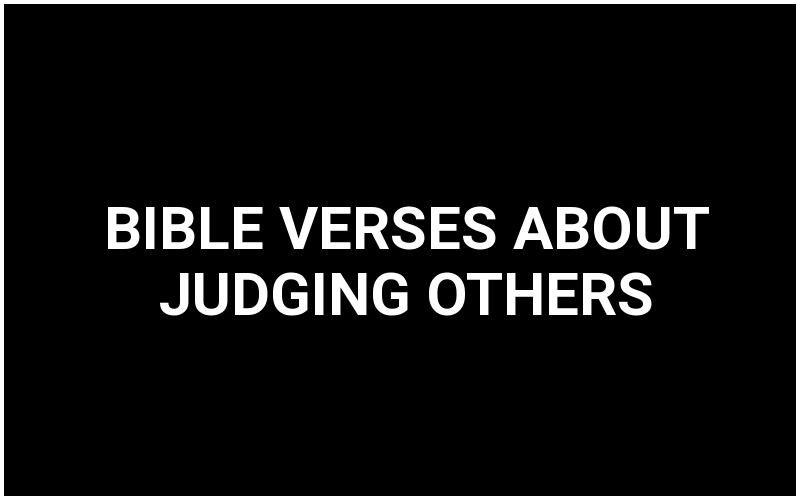In our journey as Christians, we often find ourselves confronted with the idea of judging others. It’s a topic that stirs our hearts and minds, reminding us of the importance of grace, compassion, and understanding. The scriptures abound with teachings that urge us to refrain from casting judgment on our fellow brothers and sisters. Instead of focusing on their flaws, we are called to look inward at our own hearts. Join us as we explore what the Bible says about judging others through various scriptures that illuminate our path.
Bible Verses About Judging Others
Understanding Our Own Flaws
We often find it easy to see the shortcomings in others while neglecting to acknowledge our own flaws. The Bible calls us to reflect on ourselves before we think about judging others. It challenges us to evaluate our hearts and lives sincerely. As we look within, we realize that we, too, fall short of God’s glory. Recognizing our own imperfections is a vital step in cultivating humility and compassion towards others. We are reminded to love one another and carry each other’s burdens rather than focusing on minor faults.
Matthew 7:3
“Why do you look at the speck of sawdust in your brother’s eye and pay no attention to the plank in your own eye?” – Matthew 7:3
Romans 3:23
“For all have sinned and fall short of the glory of God.” – Romans 3:23
Galatians 6:1
“Brothers and sisters, if someone is caught in a sin, you who live by the Spirit should restore that person gently. But watch yourselves, or you also may be tempted.” – Galatians 6:1
James 4:12
“There is only one Lawgiver and Judge, the one who is able to save and destroy. But you—who are you to judge your neighbor?” – James 4:12
Psalms 139:23-24
“Search me, God, and know my heart; test me and know my anxious thoughts. See if there is any offensive way in me, and lead me in the way everlasting.” – Psalms 139:23-24
Extending Grace to One Another
We all desire grace in our own lives, and it’s important that we learn to extend that same grace to those around us. Understanding that everyone is on their own spiritual journey can inspire us to be more compassionate and forgiving. God’s grace can transform our perspective and how we respond to the weaknesses of others. Instead of casting judgment, we can be a source of encouragement and love, showing others the same grace that God has freely given us. Embracing grace can lead to powerful healing in our relationships.
Ephesians 4:32
“Be kind and compassionate to one another, forgiving each other, just as in Christ God forgave you.” – Ephesians 4:32
Colossians 3:13
“Bear with each other and forgive one another if any of you has a grievance against someone. Forgive as the Lord forgave you.” – Colossians 3:13
Luke 6:37
“Do not judge, and you will not be judged. Do not condemn, and you will not be condemned. Forgive, and you will be forgiven.” – Luke 6:37
Matthew 18:21-22
“Then Peter came to Jesus and asked, “Lord, how many times shall I forgive my brother or sister who sins against me? Up to seven times?” Jesus answered, “I tell you, not seven times, but seventy-seven times.” – Matthew 18:21-22
1 Peter 4:8
“Above all, love each other deeply, because love covers over a multitude of sins.” – 1 Peter 4:8
The Danger of Hypocrisy
As Christians, it is essential to be mindful of hypocrisy. When we judge others while being guilty of the same actions, we compromise our witness and our integrity. Hypocrisy can hinder our relationship with God and others. Instead of acting like we are without sin, we should strive to be honest about our shortcomings. During these moments, we can allow God’s light to shine through us, moving away from judgment and towards genuine love and support for one another. Recognizing our own faults sets the foundation for healthier relationships built on truth and love.
Matthew 7:1-2
“Do not judge, or you too will be judged. For in the same way you judge others, you will be judged, and with the measure you use, it will be measured to you.” – Matthew 7:1-2
Luke 18:9-14
“To some who were confident of their own righteousness and looked down on everyone else, Jesus told this parable: “Two men went up to the temple to pray, one a Pharisee and the other a tax collector. The Pharisee stood by himself and prayed: ‘God, I thank you that I am not like other people—robbers, evildoers, adulterers—or even like this tax collector. I fast twice a week and give a tenth of all I get.’ But the tax collector stood at a distance. He would not even look up to heaven, but beat his breast and said, ‘God, have mercy on me, a sinner.’ I tell you that this man, rather than the other, went home justified before God.” – Luke 18:9-14
Romans 2:1
“You, therefore, have no excuse, you who pass judgment on someone else, for at whatever point you judge another, you are condemning yourself, because you who pass judgment do the same things.” – Romans 2:1
James 1:26
“Those who consider themselves religious and yet do not keep a tight rein on their tongues deceive themselves, and their religion is worthless.” – James 1:26
Matthew 23:27-28
“Woe to you, teachers of the law and Pharisees, you hypocrites! You are like whitewashed tombs, which look beautiful on the outside but on the inside are full of the bones of the dead and everything unclean. In the same way, on the outside you appear to people as righteous but on the inside you are full of hypocrisy and wickedness.” – Matthew 23:27-28
Encouraging Restoration
Our aim as followers of Christ is not just to avoid judging but to encourage healing and restoration within our community. Sometimes, we may have to point out a brother’s or sister’s error, but we should always do so out of love. Our goal is not condemnation but lifeline, guiding them back towards the truth and love of Christ. This approach to restoration requires patience, understanding, and reliance on the Holy Spirit. Let us pursue a spirit of reconciliation, offering hope and renewal to one another.
2 Corinthians 5:18
“All this is from God, who reconciled us to himself through Christ and gave us the ministry of reconciliation.” – 2 Corinthians 5:18
Matthew 7:1-5
“Do not judge, or you too will be judged. For in the same way you judge others, you will be judged, and with the measure you use, it will be measured to you. Why do you look at the speck of sawdust in your brother’s eye and pay no attention to the plank in your own eye? How can you say to your brother, ‘Let me take the speck out of your eye,’ when all the time there is a plank in your own eye? You hypocrite, first take the plank out of your own eye, and then you will see clearly to remove the speck from your brother’s eye.” – Matthew 7:1-5
Galatians 6:2
“Carry each other’s burdens, and in this way you will fulfill the law of Christ.” – Galatians 6:2
James 5:19-20
“My brothers and sisters, if one of you should wander from the truth and someone should bring that person back, remember this: Whoever turns a sinner from the error of their way will save them from death and cover over a multitude of sins.” – James 5:19-20
1 Thessalonians 5:14
“And we urge you, brothers and sisters, warn those who are idle and disruptive, encourage the disheartened, help the weak, be patient with everyone.” – 1 Thessalonians 5:14
The Unconditional Love of God
God loves us unconditionally, and that love serves as our ultimate example. We are encouraged to reflect God’s love in our relationships, extending that love to everyone without condition. By understanding God’s unconditional love, we can learn to judge less and love more. When we recognize how God sees us, we are motivated to see others through the same lens. This love compels us to create a space where individuals can feel the presence of Christ, free from judgment and filled with acceptance.
John 3:17
“For God did not send his Son into the world to condemn the world, but to save the world through him.” – John 3:17
Romans 5:8
“But God demonstrates his own love for us in this: While we were still sinners, Christ died for us.” – Romans 5:8
Isaiah 1:18
“Come now, let us settle the matter,” says the Lord. “Though your sins are like scarlet, they shall be as white as snow; though they are red as crimson, they shall be like wool.” – Isaiah 1:18
1 John 4:19
“We love because he first loved us.” – 1 John 4:19
Psalms 136:1
“Give thanks to the Lord, for he is good. His love endures forever.” – Psalms 136:1
Finding Unity in Christ
In Christ, we find our commonality and purpose. When we choose to focus on our differences instead of our shared faith, we foster division. The Bible invites us to pursue unity in Christ, reminding us that we all come from different backgrounds yet belong to one body. By promoting unity, we can remind ourselves how important it is to support one another rather than passing judgment. When Christ becomes our focus, we naturally become more loving and understanding towards each other.
Ephesians 4:3
“Make every effort to keep the unity of the Spirit through the bond of peace.” – Ephesians 4:3
Colossians 3:14
“And over all these virtues put on love, which binds them all together in perfect unity.” – Colossians 3:14
Philippians 2:2
“Then make my joy complete by being like-minded, having the same love, being one in spirit and of one mind.” – Philippians 2:2
Romans 15:7
“Accept one another, then, just as Christ accepted you, in order to bring praise to God.” – Romans 15:7
1 Corinthians 1:10
“I appeal to you, brothers and sisters, in the name of our Lord Jesus Christ, that all of you agree with one another in what you say and that there be no divisions among you, but that you be perfectly united in mind and thought.” – 1 Corinthians 1:10
Final Thoughts
We are reminded to be gentle and loving towards one another as we explore the topic of judging others. In acknowledging our own flaws and extending grace, we can foster a supportive and caring community. As we focus on the unconditional love of God, we understand the beauty of unity in Christ. Our responsibility is to encourage and uplift one another rather than criticize or condemn. We can create a space where healing and reconciliation can flourish, reflecting the heart of Christ as we journey together.
Let’s allow God’s Word to transform our hearts as we strive to love others deeply. Let’s commit to recognizing the burden of hypocrisy and choose love instead. May we aspire to uplift each other in reflection of God’s grace and mercy, building a community marked by acceptance and understanding.
For more inspiration, we invite you to check out other insightful topics, such as Bible Studies or Bible Verses About Lying.










